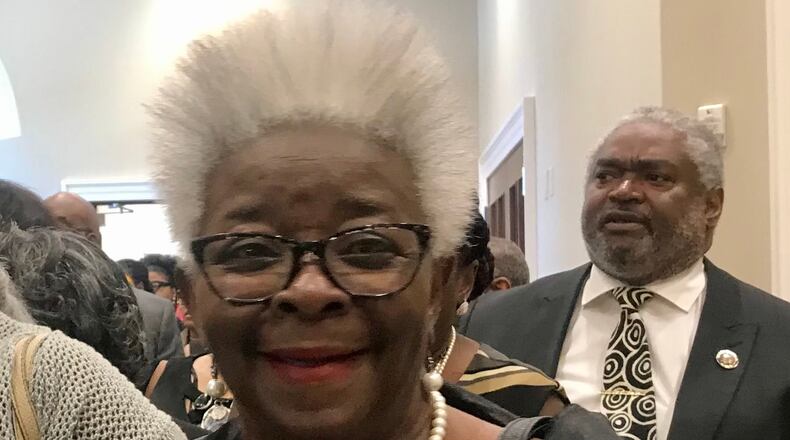A rainy spring evening in 1968 found the lights still burning at Southern Christian Leadership Conference headquarters on Auburn Avenue. About a dozen people were working on the Poor People’s Campaign, an economic justice and human rights campaign preparing to descend on Washington D.C.’s National Mall.
Then came the heart-stopping phone call: the Rev. Martin Luther King Jr. had been felled by a sniper’s bullet in Memphis.
“We were all hugging and crying and crying,” said Lula Joe Williams, a staffer doing switchboard duty that night.
That gave way to the grim realization that work needed to be done.
Cleo Orange, a supervisor, jumped in to organize staffers, putting them on the phones to notify the group’s leaders while helping them field a deluge of incoming calls and a growing number of the grieving people drawn to the office.
Equally important was her comforting of devastated coworkers that night, remembered those around her.
That ability to both nurture and to, as Williams put it, “do what needed to be done” were defining qualities of Orange. Those attributes lifted her to a behind-the-scenes, yet vital role in the unfolding civil rights movement.
She and husband the Rev. James Orange were dedicated foot soldiers, each in their own way leaving footprints that endure.
Cleophas “Cleo” Orange, 78, died of lung disease Jan. 4. She is survived by daughters Tamara and Deirdre and son Cleon. Two other daughters passed away previously. A memorial service is planned for Tuesday, Jan. 17, at 11 a.m. at Enon Baptist Church, 3550 Enon Road in Atlanta.
“To me she was a quiet storm,” said daughter Tamara. “She had a peaceful but powerful presence. She was small in stature but had a large personality and heart.”
She was peaceful in the sense that she never failed to take time to sit down, talk with and hug someone who was struggling, said the younger Orange. “It might not be but a few minutes, but in those few minutes the love would be enough,” she said.
De’Leice R. Drane, a friend and fellow civil rights activist, said that Orange was an encouraging mother figure to all, from her own kids, to nieces and nephews and those in the movement.
Cleo Orange met her husband while serving as secretary to the Rev. T.Y. Rogers, a principal in the SCLC’s Tuscaloosa, Alabama, chapter. When Rogers was asked to come to Atlanta and take the reins of the chapter and affiliate relations effort, he brought Cleo along. She and James Orange married and became fixtures at SCLC headquarters.
“Cleo was the backbone of James Orange,‘’ said Bernard Lafayette, a veteran civil rights activist who served as program coordinator for SCLC. “He really depended on her support in what he was trying to do because he was exposed to a lot of high-risk situations.”
She kept the home front and their five kids on an even keel while her husband traveled extensively as a field operative, he said.
At SCLC headquarters, she was one of a cadre of “secretaries” whose duties encompassed much more — from working with field operators on organizational projects including everything from picket lines, protests, and voter registration drives to serving as a go-betweens between outside staff and top leadership.
“She was part of the ground crew that made everything happen,” said voting rights activist Brenda Davenport. “They didn’t make a move on the outside till they checked in on the inside. "
Colleagues described Orange as an “anchor” in that effort.
She had decided opinions on both the larger picture and the organization that employed her, input she freely shared with her staff and her husband.
“I think he took what she said very seriously, and moved on it as if it was his,” Davenport said.
As the civil rights movement changed and matured, Cleo Orange trained and mentored succeeding generations, pointing out that while they didn’t have to press for change in the way that her contemporaries had, they should at “at least learn how it was done as opposed to starting like you’re starting from the beginning and nothing came before,” said Davenport.
In the years following her husband’s death in 2008, Orange continued working behind the scenes, helping daughter Jamida and the Rev. Bernice King with their work at the King Center. Jamida died in October.
The loss of both mother and daughter will make for a subdued Martin Luther King Jr. Day on Jan. 16, said Drane.
“It’s going to be a somber moment,” she said.
The Latest
Featured


